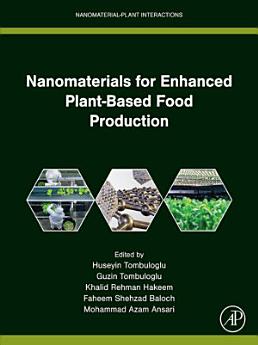Nanomaterials for Enhanced Plant-Based Food Production
About this ebook
About the author
Huseyin Tombuloglu, PhD, is an Associate Professor at the Institute of Research and Medical Consultation (IRMC) of Imam Abdulrahman bin Faisal University, Dammam, Saudi Arabia. He received his BSc degree in Molecular Biology and Genetics, an MS degree in Biology and a PhD degree in Biotechnology. He has more than 15 years of teaching and research experience in Genetics, Molecular Biology, Plant Genomics, and Biotechnology, as well as Bioinformatics. His current research focuses on nanoparticle-plant interaction. He has published more than 60 internationally indexed articles. Among those, approximately 20 recent articles are related to nanoparticle and plant interactions at molecular and physiological levels. He has also edited two books published by a global publisher.
Dr. Guzin Tombuloglu (PhD) received her MS degree (Biology) in 2008 and PhD degree (Biotechnology) in 2014. She has experience in transcriptome sequencing, genetics, molecular biology and genomics. During her PhD, she studied transcriptomics identification of boron tolerance mechanism in barley. She has experienced several projects on abiotic stress, plant stress responses, boron toxicity, transcriptomics, and nanoparticle-plant interaction on molecular level. She has given several courses on teaching Genetics, Molecular Biology, and Biotechnology education for more than 15 years. She also worked as a Chairman in Pathology Laboratory Techniques Programme and Assistant Manager at Vocational School of Medical Sciences at the university level. She is the co-editor of two international books published by Springer.
Dr. Khalid Rehman Hakeem (PhD) is Professor at King Abdulaziz University, Jeddah, Saudi Arabia. He has more both teaching and research experience in plant eco-physiology, biotechnology and molecular biology, medicinal plant research, plant-microbe-soil interactions as well as in environmental studies. He has served as the visiting scientist at Jinan University, Guangzhou, China. He has more than 110 research publications in peer-reviewed international journals has extensive book publishing experience as well. He is included in the advisory board of Cambridge Scholars Publishing, UK. He is a fellow of Plantae group of the American Society of Plant Biologists, member of the World Academy of Sciences, member of the International Society for Development and Sustainability, Japan, and member of Asian Federation of Biotechnology, Korea.
Dr. Faheem Shehzad Baloch is working as Professor of plant genetics and breeding Mersin University, Turkey and as a Brain pool fellow at Jeju National University, Jeju, Republic of Korea. He received his Ph.D. with a dissertation on ‘QTL mapping in wheat’ from the faculty of agriculture, University of Çukurova, Adana, Turkey in 2012 with a joint fellowship of Turkish ministry of education and Turkish scientific and Technological council of Turkey (TÜBİTAK). In 2013, he started to work as assistant professor at Niğde Ömer Halis Demir University, Niğde Turkey. In 2015, he joined Bolu Abant İzzet Baysal Bolu, Turkey as Assistant professor. In August 2020, he joined Sivas university of science and Technology as associate professor and is currently working as professor in the Mersin university. Dr. Faheem has more than 11 years of teaching and research experience in the plant phenomics, genetics and genomics, biotechnology specially in next generation sequencing (NGS) and DNA molecular markers in plant genetics. He led and participated in many projects funded by national and international organizations. He supervised and co-supervised MSC, PhD and post doc candidates from various countries. He visited more than 30 countries over different continents for research and collaborative purposes. He has over 135 publications in Web of Sciences database. He has co-edited 9 books and written over 25 book chapters on important aspects of molecular genetics in relation to plant species. He has extensive array of citations with over 5000 times as per google scholar with an h-Index of 36. Dr. Faheem serves as Editorial board member of several impacted journals.
Dr. Mohammad Azam Ansari is currently working as Associate Professor at the Institute for Research & Medical Consultation, Imam Abdulrahman Bin Faisal University, Dammam, Saudi Arabia. His research interest is in green synthesis of different kinds of metal and metal oxides nanomaterials by using various part of the plants, and their interaction with plants, microbes and the environment. He is also working on the application of nanotechnology in food safety and security and removal of toxic pollutants from foods and environment. He has published in journals of repute including Science of The Total Environment, Plants, Chemosphere, Journal of Photochemistry and Photobiology B: Biology, Environmental Science: Water Research & Technology, Planta Medica, Saudi Journal Of Biological Sciences, Journal of Fungi. He has served as referee for a number of international journals, including Applied Microbiology, Biomolecules, Journal of Nanostructure, Advances in Natural Sciences: Nanoscience and Nanotechnology








